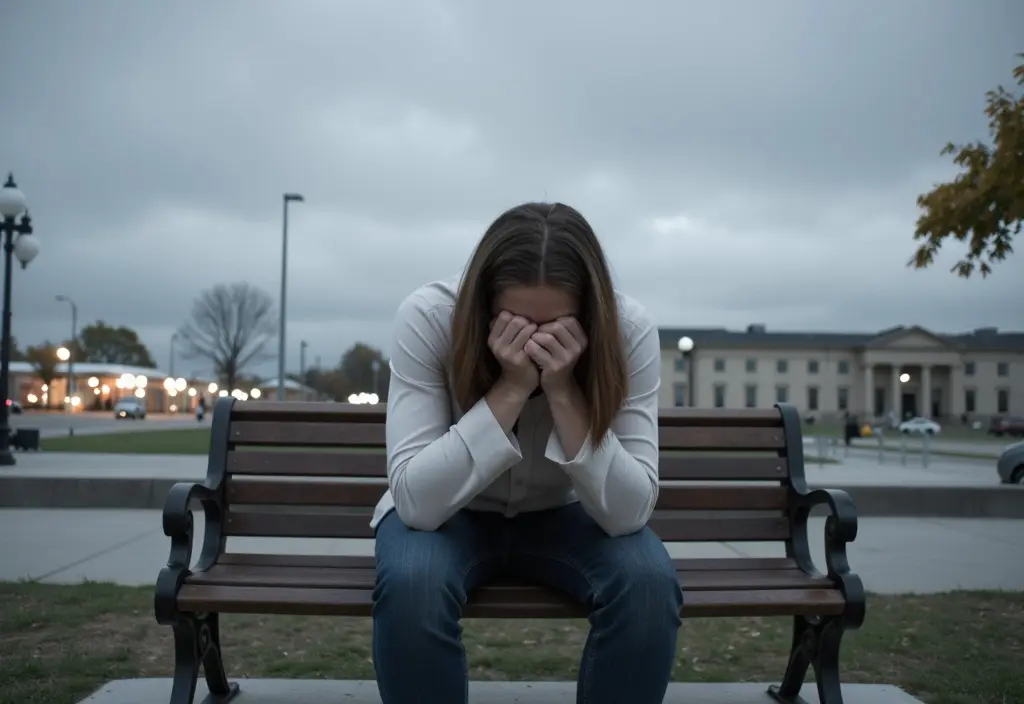Regret. It’s a heavy word. It lands like a stone in your gut. It can feel like a cold, dense fog that settles in your soul, replaying your worst moments on an endless, torturous loop. You know the feeling. It’s the sting of words you wish you could snatch back out of the air, the dull ache of decisions that led you down the wrong path, and that haunting echo of “if only.”
We’ve all been there, lost in the maze of our own past mistakes. For years, I carried a backpack full of them myself, each one a heavy stone I stubbornly refused to set down. It’s a universal human experience, this burden of regret. But the real question, the one that keeps us up at night, is what in the world do we do with it? If you’re looking for answers, you’re not alone. So, let’s explore together what the Bible says about regret, because its perspective doesn’t just help you manage the feeling—it has the power to transform it entirely.
At the heart of this conversation is a single, powerful verse from the Apostle Paul. It’s a verse that acts like a prism, splitting the single concept of regret into two very different colors: one that leads to life, and one that leads to death.
More in Ethics & Morality Category
What the Bible Says About Other Religions
What the Bible Says About Murder
Key Takeaways
- The Bible makes a critical distinction between two types of regret: “godly sorrow” and “worldly sorrow” (2 Corinthians 7:10).
- Godly sorrow is a constructive force. It isn’t about self-pity; it’s about recognizing our sin before a holy God, which leads to genuine repentance and a changed life.
- Worldly sorrow is a destructive force. It focuses on the painful consequences, our damaged pride, or the fear of getting caught, ultimately leading to despair and spiritual death.
- True repentance, born from godly sorrow, is a decision we never have to regret because it results in salvation and restored fellowship with God.
- The stories of Peter and Judas provide a stark, real-world contrast between godly sorrow (which leads to restoration) and worldly sorrow (which leads to destruction).
- God’s grace is more than enough to overcome even the most persistent feelings of regret, offering a forgiveness we must choose to live in, even when we struggle to forgive ourselves.
Ever Feel Weighed Down by Regret? What if There’s a Better Path?
The feeling is unmistakable, isn’t it? A pit in your stomach. A tightness in your chest. It’s the mental slideshow of your failures playing on a loop at 3 a.m. For me, one of those moments came early in my career. I was young, ambitious, and frankly, a bit arrogant. I made a business decision that was ethically gray, cutting a corner to close a deal faster. I told myself it was “just business.” But when it blew up in my face, costing the company a significant amount of money and trashing my reputation, the regret was crushing.
But what was I really sorry for? Was I heartbroken over my lack of integrity? Or was I just humiliated that I got caught and failed?
This is the exact distinction the Bible makes. The Apostle Paul, writing to the Corinthian believers, puts it this way:
“For godly sorrow produces a repentance that leads to salvation without regret, whereas worldly sorrow produces death.” – 2 Corinthians 7:10 (ESV)
Paul isn’t saying sorrow is bad. Not at all. Instead, he reveals that it’s a fork in the road. The feeling of regret isn’t the destination; it’s the catalyst. Where it pushes you next is what matters. It can either push you toward God or pull you further down into yourself, away from Him.
Is All Regret the Same in God’s Eyes?
Clearly not. Paul lays out two categories that couldn’t be more different in their final destination. Think of it like this: Imagine two people get a serious but treatable diagnosis from their doctor.
One person feels a “godly sorrow.” They’re grieved by the diagnosis because they recognize it’s a real threat. That sorrow motivates them. They listen to the doctor, change their diet, take their medicine, and follow the treatment plan precisely. Their sorrow produces positive action—repentance—that leads to health and life.
The second person feels a “worldly sorrow.” They are also grieved, but their sorrow is rooted in self-pity. “Why me?” they lament. They fixate on what they can no longer do, the unfairness of it all. This sorrow paralyzes them. They wallow in despair, ignore the doctor’s advice, and refuse treatment. Their sorrow produces only death. The initial feeling was the same, but where they focused their sorrow made all the difference.
What Does “Worldly Sorrow” Actually Look Like?
Worldly sorrow is regret that is fundamentally selfish. It’s all about me, me, me.
Looking back at that business failure, it’s painfully clear. My regret was 100% worldly. I was sick with anxiety, not because I had dishonored God, but because my reputation was in tatters. I was devastated, not because I had compromised my integrity, but because my boss was furious and my career path was suddenly blocked. My sorrow was about the consequences I was facing, not the sin I had committed.
This is the regret of King Saul, who, when confronted by the prophet Samuel, was more concerned with his image in front of the people than his blatant disobedience to God (1 Samuel 15:30). It’s the regret of Esau, who wept bitterly over his lost blessing but never truly repented of despising his birthright in the first place (Hebrews 12:17).
It’s a dead-end street. It keeps the focus on us—our pain, our loss, our embarrassment. And because it’s a closed loop that never looks up to God for a solution, it ultimately leads to despair and spiritual death.
So, What Exactly Is This “Godly Sorrow” Paul Talks About?
If worldly sorrow is a dead end, godly sorrow is a doorway. It’s a kind of regret that, while deeply painful, is incredibly productive. It’s the kind of sorrow that sees sin for what it truly is: not just a mistake, but a rebellion against a holy and loving God.
When you experience godly sorrow, the primary pain isn’t “I got caught” or “I look like a fool.”
The primary pain is “I have broken the heart of God.”
This is the sorrow that ripped through King David after his horrific sin with Bathsheba. In his gut-wrenching prayer of repentance, Psalm 51, he doesn’t whine about losing his kingdom or his reputation. His cry is vertical. “Against you, you only, have I sinned and done what is evil in your sight.” He understood his sin was ultimately an offense against God Himself. This deep, God-centered grief is what clears the path for real healing.
How Can Pain Lead to Repentance Instead of Despair?
Godly sorrow is the only kind of sorrow that leads to metanoia—the powerful Greek word for repentance. This isn’t just about feeling bad. It means a total change of mind, a 180-degree turn in direction. It’s seeing your sin, hating it for what it did to your relationship with God, and turning from it to run back toward Him.
This is the beautiful alchemy of the Gospel. God takes the poison of our regret and, through godly sorrow, transforms it into the antidote of repentance. The pain doesn’t just vanish; it gets repurposed. It becomes the very engine that drives us back into the arms of the Father, just like the Prodigal Son. He hit rock bottom in a pigsty, full of regret. But his sorrow wasn’t just about his hunger; it was the crushing realization of the relationship he had shattered with his father. That godly sorrow is what made him get up and start the long walk home.
Can You Spot the Difference in Your Own Life?
Here’s a practical way to tell the difference:
- Worldly Sorrow says: “I can’t believe I did that. My life is ruined. How will I ever fix this?” It’s obsessed with the problem and the self.
- Godly Sorrow says: “Oh Lord, I can’t believe I did that. I sinned against You. Please forgive me and change my heart.” It’s focused on the sin and the Savior.
One leads to a frantic scramble to manage consequences. The other leads to a humble plea for mercy. This distinction changes everything.
What Does the Bible Show Us About Regret in Real Life?
The Bible isn’t a sterile textbook of ideas; it’s filled with the raw, messy stories of real people. And when it comes to these two types of sorrow, you won’t find a more powerful case study than two of Jesus’s own disciples: Peter and Judas.
Both men failed spectacularly on the night of Jesus’s arrest. Both betrayed Him. Both were slammed with immediate, overwhelming regret. But the path each man took from that point of regret reveals the life-or-death difference between worldly and godly sorrow.
What Can We Learn from Peter’s Denial and Judas’s Betrayal?
Judas betrayed Jesus for a bag of silver. When he saw that Jesus was condemned, Matthew 27 tells us he was “seized with remorse.” He knew he’d done a terrible thing. He even tried to undo it by returning the money. “I have sinned,” he said, “for I have betrayed innocent blood.”
On the surface, it looks like repentance. He confessed. He tried to make it right. But his sorrow was worldly. It was a hurricane of self-hatred and despair over the horrifying consequences of his actions. It was not a sorrow that looked to the betrayed Jesus for mercy. It was a sorrow that looked inward, saw only a black hole of guilt, and led him to take his own life. His worldly sorrow produced death.
Now, look at Peter. That same night, he denied he even knew Jesus three times. Then the rooster crowed. Luke 22:61 says, “The Lord turned and looked straight at Peter.” In that single glance, the weight of his failure crashed down on him. He “went outside and wept bitterly.”
This was a deep, soul-crushing sorrow. But it was a godly sorrow. Why? Because Peter’s weeping wasn’t the end. His grief didn’t drive him to despair; it eventually drove him back to the very One he had denied. After the resurrection, Jesus found Peter on a beach and restored him. He gave him a new mission. Peter’s sorrow, as agonizing as it was, produced repentance that led to salvation and a world-changing ministry.
Two men. Two terrible failures. Two overwhelming regrets. One sorrow led to a rope. The other led to restoration and Pentecost.
How Do I Move from Paralyzing Regret to Productive Repentance?
Knowing the difference is one thing. Living it is another. So how do we actively choose godly sorrow when we’re confronted with our own sin? How do we ensure our regret becomes a doorway to God, not a dead-end street?
It starts with a conscious shift in focus. It’s a deliberate choice to stop staring inward at our shame or sideways at our circumstances and to instead look upward at the character of God.
Several years after my career blunder, I faced a different kind of regret. This one was personal. I had fallen into a pattern of impatience and anger with my family. I was sharp with my words and short on grace, especially when stressed. One evening, after a particularly harsh comment to my wife, I saw a look of deep hurt in her eyes that just broke me.
The sorrow I felt in that moment was different. It wasn’t worldly, worried about what she would think or if we would fight. It was godly. I was crushed by the fact that I had wounded someone I love, and that my behavior was such a pathetic reflection of the God I claim to follow. My sin felt ugly. I hated it not for its consequences, but for what it was.
That night, my apology was different. My prayer was different. It wasn’t, “God, get me out of this.” It was, “God, get this out of me.” That godly sorrow was the start of real, intentional change in my life.
What Practical Steps Can I Take Today?
Moving from worldly sorrow to godly repentance isn’t mystical. It’s a gritty, active process of turning. Here are some steps:
- Be Specific and Honest: Don’t just say, “I messed up.” Name the sin. Call it what God calls it. Pride? Greed? Lust? Deceit? Confess it specifically. “I was prideful.” “I was dishonest.”
- Confess Without Excuses: The temptation is always to follow a confession with a “but…” Worldly sorrow loves excuses. Godly sorrow takes full ownership. No justifications.
- Embrace the Cross: Remind yourself that Jesus already paid for this. All of it. Repentance isn’t about earning forgiveness; it’s about agreeing with God about your sin and humbly accepting the forgiveness already bought for you.
- Turn and Make a Plan: Repentance means turning away. This often requires a practical plan. If your sin is gossip, who do you need to stop talking to? If it’s lust, what do you need to delete? Turning requires action.
What Happens When the Feeling of Regret Just Won’t Go Away?
This is a tough one. What about those deep regrets, the ones that leave permanent scars? What if you’ve confessed, you’ve repented, you believe God has forgiven you… but the awful feeling of guilt still haunts you? You’re not alone. This is often where the real battle begins, a last-ditch effort by the enemy to keep you chained to a past God has redeemed.
Is It Possible God Has Forgiven Me, But I Haven’t Forgiven Myself?
This phrase, “I just can’t forgive myself,” sounds humble, but it can mask a subtle form of pride. To say this is often to imply that our standards are higher than God’s. We are essentially saying, “God, your forgiveness through the cross of Jesus is nice, but it’s not quite enough to cover what I did.”
When we refuse to let go of the guilt for a sin God has forgiven, we are trusting our feelings more than His promises.
And His promise is crystal clear: “If we confess our sins, he is faithful and just to forgive us our sins and to cleanse us from all unrighteousness” (1 John 1:9). God doesn’t just forgive; He cleanses. When we cling to our guilt, we are telling God, “Thanks for the bath, but I’d rather stay muddy.” The work is done. Our challenge is to live like it’s true. For a deeper look into the mechanics of forgiveness, the University of California, Berkeley’s Greater Good Science Center offers valuable insights into why it’s so crucial.
How Can God’s Grace Overcome Persistent Guilt?
Fighting lingering guilt is a battle of faith, fought with the weapon of truth. It means actively preaching the Gospel to yourself every single day. When the feelings of regret surface, you must meet them head-on with the truth of God’s Word.
- When you feel condemned, declare Romans 8:1: “There is therefore now no condemnation for those who are in Christ Jesus.”
- When you feel defined by your past, declare 2 Corinthians 5:17: “Therefore, if anyone is in Christ, he is a new creation. The old has passed away; behold, the new has come.”
- When you feel your sin is too great, declare Isaiah 1:18: “Though your sins are like scarlet, they shall be as white as snow.”
Living in freedom isn’t about never remembering your past failures. It’s about letting those memories trigger gratitude for God’s grace, not shame for your sin. The scar remains, not as a source of pain, but as a testimony to the healing power of the Great Physician.
Regret is inevitable. We are broken people in a broken world. We will make mistakes. We will have regrets. But thanks be to God, regret is not the end of the story. Through the lens of 2 Corinthians 7:10, we see it for what it is: a signpost.
It can point us down the road of worldly sorrow—a road of bitterness, self-pity, and despair that leads only to death.
Or, it can point us to the path of godly sorrow. This path is harder. It requires humility. It requires honesty. It requires a painful look at our own sin. But this road leads to true repentance, to a life-changing encounter with grace, and to a salvation so secure that it is “without regret.”
Which path will you choose?
FAQ – What the Bible Says About Regret

What should I do if I still feel guilt after confessing and repenting?
Live in the truth of God’s promises by declaring scripture like Romans 8:1 and 2 Corinthians 5:17, trusting God’s grace. Remember that lingering guilt is often a lie; God’s forgiveness is complete, and living in His grace brings true freedom.
How do I turn my regret into productive repentance?
Start by focusing on God’s character, confessing specific sins without excuses, embracing Christ’s forgiveness, and making practical plans for change. This active process transforms regret into a pathway back to God.
What can we learn from the stories of Peter and Judas about regret?
Peter’s deep regret led to repentance, restoration, and a fruitful ministry, exemplifying godly sorrow. Judas’ remorse, rooted in self-hatred and despair, resulted in spiritual death, showing the destructive nature of worldly sorrow.
How can I tell if my regret is leading me toward repentance or despair?
If your regret focuses on recognizing your sin against God and leads you to seek forgiveness and change, it is godly sorrow. If it centers on self-pity, shame, or fear without seeking God’s mercy, it is worldly sorrow.
What is the difference between godly sorrow and worldly sorrow according to the Bible?
Godly sorrow is a constructive feeling that leads to genuine repentance and a changed life, recognizing sin as a rebellion against God. Worldly sorrow is destructive, focused on self-pity and the consequences of sin, often resulting in despair and spiritual death.




